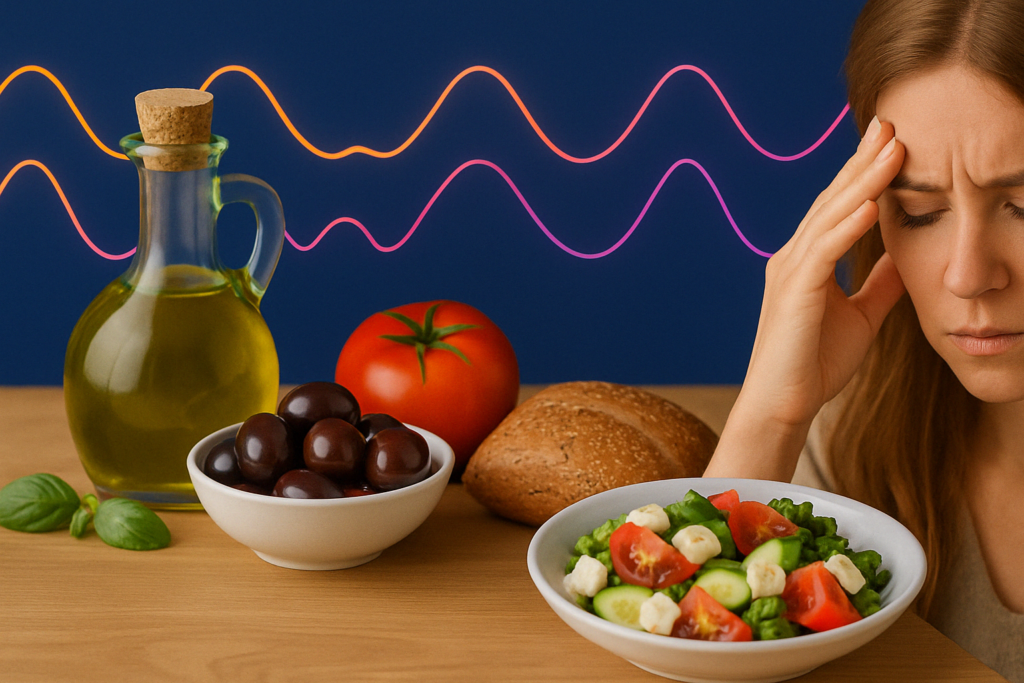The effects of brainwave entrainment associated with the Mediterranean diet on clinical symptoms of depression: a randomized controlled trial
ABSTRACT
Introduction and Objective
Major depressive disorder (MDD) is a multidimensional illness that alters mood and impairs quality of life. The Mediterranean diet (MD) is effective in reducing depressive symptoms. Additionally, reduced stress, anxiety, and improved sleep have been observed with brainwave entrainment (BE). This study evaluated symptoms of depression (Hamilton Depression Rating Scale – HAMD) as well as anxiety levels (State-Trait Anxiety Iventory (STAI), resilience (Brief Resilience Scale – BRS), perceived stress (Perceived Stress Scale – PEE), quality of sleep (Pittsburgh Sleep Quality Index – PSQI) and quality of life (Medical Outcomes study 36-item Short-Form Health Survey – SF36), in individuals with MDD.
Methods
This is a randomized, double-blind, placebo-controlled study conducted at the Laboratory of Experimental Neurosciences (LaNEX) of the University of Southern Santa Catarina (UNISUL), Brazil. 29 female patients with MDD were randomly assigned to: MD+BE (n=15) or MD+BE Placebo (n=14) group. Clinical assessments were conducted at baseline and after 30 and 60 days. Participants underwent daily 20-minute BE sessions: one audiovisual session with a BrainTap headset (New Bern, NC) at the university clinic on MON, WED and FRI and one audio BE sessions with an Mp3 file on TUE, THU and SAT. Sessions consisted of Binaural beats and Isochronic Tones varying in the alpha (8 to 12 Hz), theta (4 to 7 Hz) or delta rages (0.5 to 3 Hz); visual Entrainment was delivered through light-emitting diode at 470 nanometers (nm) flickering at the same rate. Placebo BE sessions were delivered in the Beta range (13 to 30 Hz).
Results
HAMD scores decreased in both groups: on day 30 and 60 when compared to baseline evaluation (two-way ANOVA and Bonferroni post hoc test). Both groups presented improvement in the PQSI on day 60. BRS score increased only in the MD+BE group on day 60. Reductions in anxiety levels and perceived stress were found in both groups at the final 60-day assessment. Improvements in the levels of aspects analyzed (vitality, social aspects) in the quality-of-life questionnaire were found from the 30-day evaluation in both groups. Only the MD+BE group showed improvement in the limitation due to emotional aspects (quality of life questionnaire) after the 60-day evaluation.
Conclusions
Both MD and BE effectively decreased the clinical symptoms of depression. The association of BE to MD produced more pronounced results. These data suggest that BE may be an effective adjunct tool to the treatment of depression.
Keywords: Depression; Mediterranean Diet, Brainwave Entrainment, Quality of Sleep, Resilience
Trial registration: RBR-2t5svsq on ReBEC.
Figures

Figure 1 – Hamilton Rating Scale for Depression (HAM-D).

Figure 2 – Pittsburg Quality of Sleep Index (PQSI).

Figure 3 – Resilience Scale and Perceived Stress Scale.

Figure 4 – State-Trait Anxiety Iventory (STAI)

Figure 5 – Medical Outcomes Short-Form Health Survey (SF-36)

Figure 6 – Medical Outcomes Short-Form Health Survey (SF-36)

Figure 7 – Medical Outcomes Short-Form Health Survey (SF-36)

Figure 8 – Medical Outcomes Short-Form Health Survey (SF-36)
Study #14 – Master’s degree dissertation in the postgraduate Program in Health Sciences of the University of Southern Santa Catarina, SC, Brazil. Conducted at the Physiotherapy
School Clinic and the Medical Specialty Clinic (AMEI) of the University of Southern Santa Catarina, SC, Brazil.
